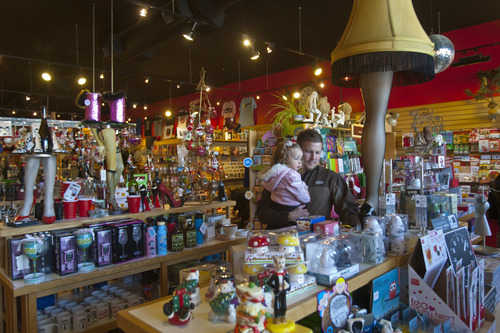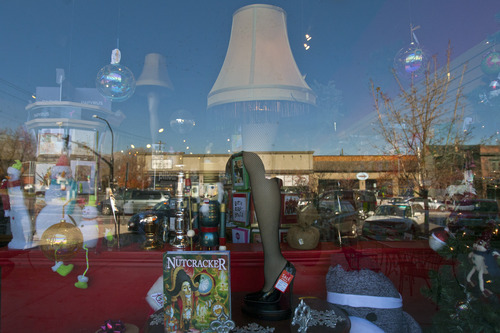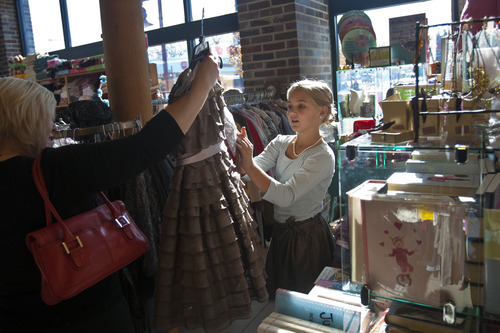This is an archived article that was published on sltrib.com in 2012, and information in the article may be outdated. It is provided only for personal research purposes and may not be reprinted.
With "Black Friday," "Small Business Saturday," "Cyber Monday," and now "Give Back Tuesday," retailers are running out of days of the week to promote themselves.
But "Small Business Saturday" may have the most direct impact on local communities. On the first Saturday after Thanksgiving, holiday shoppers are encouraged to seek out independent neighborhood retailers instead of chain stores to help boost the local economy.
On Saturday, Buzz Fenton and his family were doing their part. The group was at The Children's Hour clothing store at the corner of 900 S. 900 East in Salt Lake City buying clothes for Fenton's grandchildren.
"I love coming here because the styling is unique, and I've gotten to know [store owner Diane Etherington], and she knows my tastes," said Fenton, 67, of Salt Lake City. "The last four years I've come here exclusively for my grandkids."
Fenton said that personal service is something he would never get at big-box retailers like Walmart or Target, so he never shops at national chains for clothes.
"In downtown Salt Lake City, most of the businesses outside the malls are local independents, not chains," said Camille Winnie, director of the Downtown Merchant's Association. "There is a resurgence of that idea of unique and local businesses. You want to know the people you're buying from."
While large national stores moving into a city can help the economy, local retailers actually can have a greater impact, said Kristen Lavelett, assistant director for Local First Utah, a statewide non-profit organization promoting local businesses.
In a new study commissioned by Local First Utah, small independent retailers return 52 percent of what they make to the local economy, compared to 14 percent returned by chains. The study concluded that if shoppers shifted just 10 percent of their buying from chains to local stores, it would add $487 million to the state's economy each year.
"People don't have a firm knowledge of the benefits of local businesses," Lavelett said. "It makes sense that a big national retailer would offer more money to the local economy. But that's just not true."
Lavelett cites areas like 900 S. 900 East, 1500 S. 1500 East, 300 South from 400 West to 500 East, 2100 S. 2100 East in Salt Lake City, Murray-Holladay Road and Holladay Boulevard, and Redwood Road and 3500 South as Salt Lake County neighborhoods with thriving local stores.
At 11 a.m. Saturday, customer traffic at Cahoots on the corner of 900 South and 900 East in Salt Lake City was light, but store manager Tiffany Sommer said it would pick up in the afternoon.
"Saturdays are pretty big for us anyway, but there has been a push for local, especially in the 9th and 9th area," she said. "Our customer base is loyal, and I've had people tell me more and more when they come in that they want to shop locally."
"Small Business Saturday" was conceived in 2010 by American Express. Promoted through social media, the campaign was embraced by city leaders across the country. American Express offered a one-time $25 credit to cardholders who registered for the campaign and then shopped at a qualifying local store Saturday.
Etherington, the owner of The Children's Hour, said it has become more difficult to compete against the big retailers, especially with the rise of Internet shopping.
"The Internet hurts us a ton. You won't believe how many say, 'I'll just buy that online,'" she said. "But they're taking tax away from the city and they're taking the economy away."
Lavelett encourages customers to think about whether buying something online or at a big retailer for less money is really better.
"Cheaper isn't always better," she said. "A lot of times when we choose cheaper, we lose value. We lose a quality good for the sake of something that costs less money. But what we're really sacrificing is a piece of our community."







